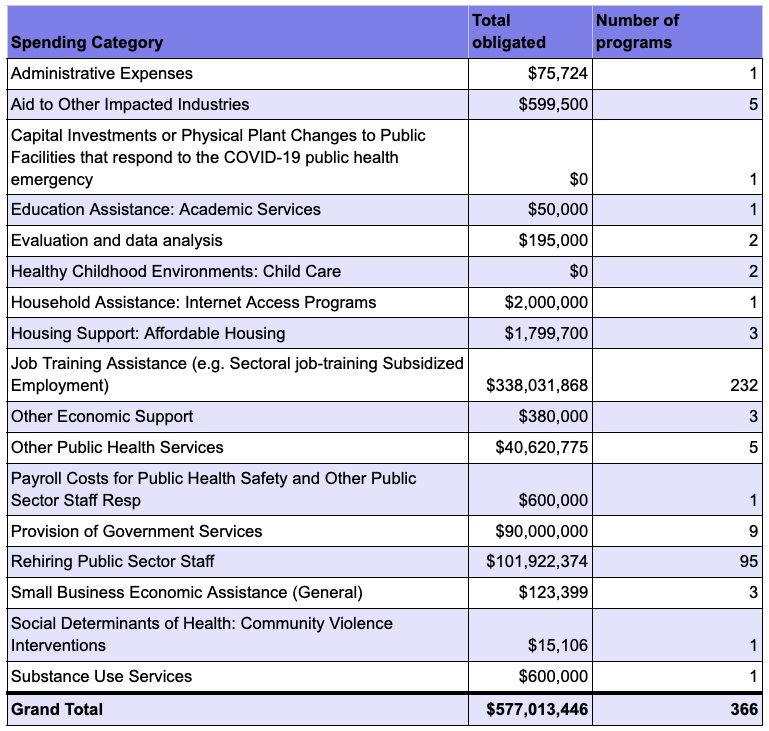Connecting state and local government leaders
State and local governments are planning to devote nearly $600 million from the American Rescue Plan Act to workforce initiatives, in addition to other federal grants. Here's a closer look at the spending.
You're reading Route Fifty's Public Finance Update. To get the latest on state and local budgets, taxes and other financial matters, you can subscribe here to get this update in your inbox twice each month. You can find a full archive of these newsletters here.
Public Finance Update - Aug. 16, 2022
Welcome back to Route Fifty’s Public Finance Update! I’m Liz Farmer. This week, we’re looking at how state and local governments are spending millions of dollars in federal pandemic aid on workforce initiatives. Amid the Great Resignation and a major workforce shortage, states and localities have so far made plans to dedicate nearly $600 million from their American Rescue Plan Act allotments to jumpstart job training, hiring and worker retention programs.
That figure is in addition to $500 million in workforce grants awarded this month by the U.S. Commerce Department, putting the total planned workforce spending near $1.1 billion. The final amount will likely be even higher as more governments update their ARPA spending reports.
The spending comes as the jobs recovery from the pandemic has left big gaps in a number of industries—including state and local government. Even with this month’s strong employment report, the public sector is still down almost 600,000 jobs compared to before the pandemic.
“That’s a really large hole to dig out of on the talent acquisition side,” said Peter Morrissey, director of the Volcker Alliance’s Government to University Initiative.
As it stands, states and localities have reported obligating more than $577 million in ARPA funding for 366 different workforce-related programs, according to my analysis of fiscal recovery fund spending. The data, which is provided publicly by the Pandemic Response Accountability Committee, covers the period from March 3, 2021 through Dec. 31, 2021.

The types of programs governments are funding with recovery aid to try to bolster the workforce run the gamut, from housing initiatives to sector-specific programs to hiring subsidies.
Just under 18%, or nearly $102 million, of the planned spending is going toward public sector rehiring initiatives, with many of these focusing on public safety.
Citrus Heights, California, has approved using $5.4 million in ARPA funding to refill 22 public safety positions through 2023. Further south, Cathedral City has set aside $9.5 million for rehiring about 17 positions across the city. In New Jersey, Clifton created a position solely to handle ARPA reporting requirements and has obligated $371,000 to cover it for at least two years.
Overall, however, many of the “rehiring” initiatives are one-time expenses, such as new equipment, bonuses, back pay for furloughs or recruitment campaigns.
Bill Glasgall, director of state and local initiatives at The Volcker Alliance, said governments in general have been reluctant to use ARPA dollars for permanent positions given the temporary nature of the funding. Doing so, he warns, “may present a problem down the road if increases get baked into salaries and result in long-term increased wage, fringe, and pension costs that may not have a clear funding source after ARPA money runs out.”
Boosting the Local Workforce
The bulk of ARPA funding so far, however, aims at increasing local area employment. That’s no surprise, said Laura Goddeeris, ICMA’s director of Survey Research, noting that a survey last fall found that rehiring of government staff was a relatively low priority for investment, while small business assistance ranked much higher.
Many programs focus on industries where workforce shortages are the highest. According to the U.S. Chamber of Commerce, durable goods manufacturing, wholesale and retail trade, and education and health services have the largest labor shortages. These industries have more unfilled job openings than unemployed, experienced workers.
For example, Massachusetts has set aside more than $40 million in ARPA funds to temporarily boost payments to health care providers across the state. And Gallatin County, Montana is using nearly $2 million to boost jobs in manufacturing, construction and healthcare.
The child care provider shortage has also been a barrier for many people seeking to return to work. A few places (Alexandria, Virginia; Boston; Los Angeles County; and Washington County, Oregon) have put forward plans to direct ARPA money to providers to hire more child care workers, although no dollars had been obligated by the end of 2021.
Investment in career pipelines is also a big theme, with around three dozen ARPA aid recipients planning jobs or training programs in partnership with colleges, universities and high schools. Some states are also using ARPA funds for tuition assistance as part of these programs.
Some places are using the funding to boost their local workforce in more indirect ways. For example, Prince George's County, Maryland is offering to pay 50% to 75% of a new employee’s salary for up to 12 weeks for businesses that hire residents and meet other qualifications.
A few are tapping funds to support workforce housing. Macon-Bibb County, Georgia has set aside $1.6 million for nonprofits to create housing. Lincoln, Montana has obligated about $200,000 to support a project that would build three housing units on 10 acres next to Hi Country Snack Foods, a meat processing plant that is the area's largest employer. The homes would be “made available as affordable rentals to Hi Country employees, or if availability allows, other Lincoln-based employees,” the filing says.
And Palm Beach County, Florida plans on using $20 million to support construction of an affordable/workforce residential development in a county-owned lot. The project aims to provide over 100 housing units on an approximately 19-acre parcel, according to the county’s filing.
New Mindset for Government Recruiting
A number of initiatives to boost both public and private sector hiring focus on overlooked populations, such as individuals with disabilities, a group that represents as much as 15% of the global population and are underemployed to a staggering degree. Memphis, Tennessee; Gloucester County, New Jersey; and the state of Montana all have such programs aimed at private sector jobs.
Organizations, in general, are also increasingly looking at neurodiverse individuals—those who interact with and process their surroundings in atypical ways due to neurological or behavioral conditions such as autism, ADHD or dyslexia. The tech world has already begun to recognize that these folks can exhibit heightened capabilities, such as accelerated problem solving or precisely following instructions, that make them well suited for information technology careers.
Arapahoe County, Colorado noted in its ARPA filing that widening its recruitment in this way also strengthens its Diversity Equity and Inclusion efforts. The county is tapping ARPA funds to support a $568,000 program to recruit underemployed talent to work in government.
“The pandemic has forced us to look at recruiting differently,” the county’s filing said.
“No longer, can we as an organization sit and wait for applicants to apply,” it added. “We need to source candidates and conduct preemployment actions quicker than before. This requires face to face, proactive, brand marketing…. This will allow us to search out candidates from non-traditional resources (organizations for minorities, dyslexia, autism, etc.).”
For state and local governments in particular, adapting to this competitive hiring environment will require more outside-the-box thinking, said the Volcker Alliance’s Morrissey.
“Because state and local finances have been quite constrained since even before the 2008 recession, many states and localities lack familiarity with aggressive recruiting or retention practices in a competitive labor market,” he said. “In many cases, they are really needed to work to build the muscle of becoming more agile hire-ers and employers.”

NEXT STORY: How the Pandemic Is Leaving a Lasting Mark on Mountain Towns



